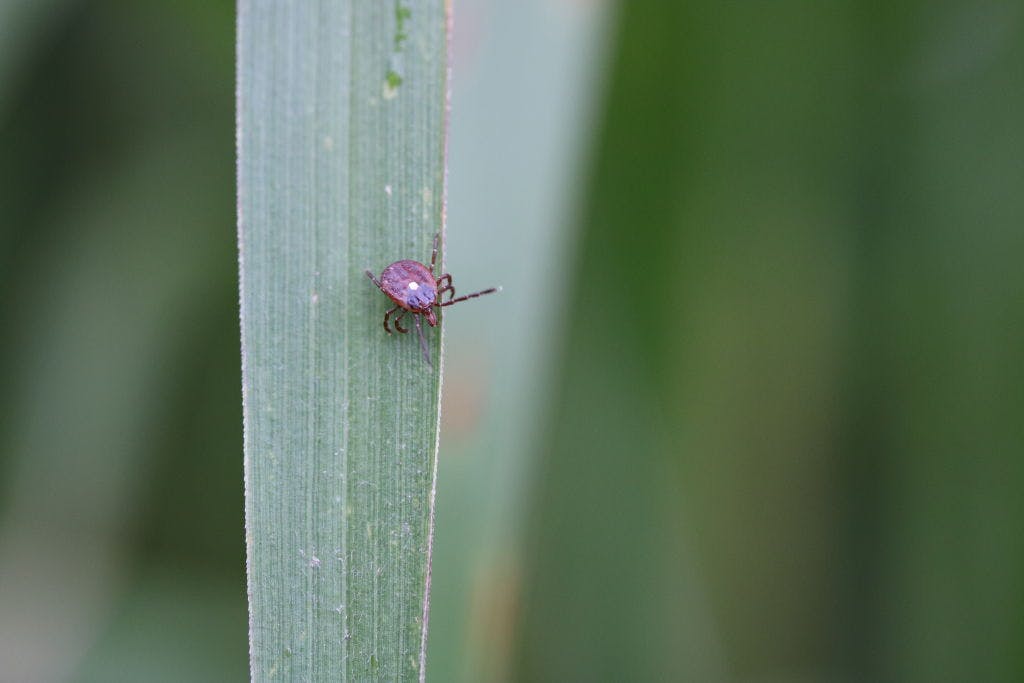The Tick That Makes People Allergic To Meat — And The Climate Cult Wants To Breed Trillions More

In the summer of 2024, a 47-year-old airline pilot from New Jersey was camping with his wife and children. After eating a beef steak for dinner, he awoke in the middle of the night with stomach pains, along with other symptoms, including vomiting and diarrhea. In the end, his symptoms cleared up, and he decided against going to a doctor — even though, earlier in the summer, he had told his wife about the presence of 12 tick bites on his ankles. Whatever those ticks had done, the airline pilot concluded, it probably wasn’t life-threatening. Then, just two weeks later, the man attended a barbecue with his wife, where he ate a hamburger. Within four hours, he was unconscious on the floor of his bathroom. Paramedics tried to revive him, but it was too late. He was dead.
Live Your Best Retirement
Fun • Funds • Fitness • Freedom
Initially, the death was recorded as “unexplained.” But the man’s doctor wasn’t happy with that explanation, so he sent his bloodwork to an allergy specialist, who quickly identified the cause. The airline pilot had contracted a tick-borne meat allergy known as alpha-gal syndrome, or AGS — which, until this particular case, wasn’t considered fatal. In fact, you’ll find plenty of scientific journal articles referring to AGS as a “nonfatal allergy.” But this 47-year-old airline pilot, for the first time in recorded history, had proven otherwise.
He became the first reported fatality of AGS, anywhere in the world.
Watch:
Credit: NBC News/YouTube.com
As you heard, hundreds of thousands of people are suffering from AGS, otherwise known as the red-meat allergy. None of these hundreds of thousands of people have died as a result of this allergy, although they’ve had serious complications. So a lot of important questions need to be answered at this point, starting with — what, if anything, was different about this particular victim? How many more victims might be out there, who haven’t been diagnosed through a postmortem allergy test? And maybe most importantly: What exactly is AGS, and where did it come from?
These are questions that most medical professionals can’t begin to answer. In surveys, a majority of doctors report they have no idea how to diagnose or treat the disorder. And that’s not surprising, because Alpha-Gal Syndrome was discovered just a few decades ago, during clinical trials for a drug that was intended to treat cancer.
Here’s the story of that discovery, as I understand it. Some patients enrolled in the clinical trial, took the cancer drug, and then developed hives immediately after receiving the first IV dose. The patients had somehow developed antibodies to the drug before they ever took it. It turns out that these particular patients were from the same area of the country where the Lone-Star tick is common — mainly the East and South-Central United States. And on top of that, the researchers realized that the cancer drug (because it was grown in mouse cells) contained a sugar molecule called “alpha gal,” which the Lone-Star tick transmits to humans. So it appeared as though patients had been bitten by ticks, developed a sensitivity to the sugar molecule, and then overdosed when the sugar molecule was administered via an IV.
To be clear, alpha-gal is not man-made. It’s sugar that exists in the cells of most mammals, with the exception of humans. When it enters our body, our immune system treats it like a foreign pathogen, and triggers a serious overreaction. But you might wonder: If alpha-gal has been around for zillions of years, why exactly did it take so long for scientists to realize that ticks can cause a meat allergy by transmitting alpha-gal?
The official explanation is that, normally, when you have an allergic reaction, the symptoms appear pretty quickly. If you get stung by a bee, for example, you’ll be showing symptoms within two hours, maximum. But with alpha-gal, it’s different. The sugar is stored in fat. And it takes a while to digest that fat. So you might eat a hamburger, have no obvious reaction whatsoever, and then die four hours later. And given that timeframe, no one would suspect an allergic reaction to a hamburger. It wasn’t until this cancer trial — where the drug was administered by an IV — that the link between alpha-gal and the allergic reaction became obvious.
I have no reason to doubt any of this background information, most of which I looked up online last night. I’m willing to accept that, in medicine, significant discoveries aren’t easy. Sometimes they happen by chance. Sometimes novel diseases are discovered while researchers are working on a completely separate treatment. Of course, it’s also the case, as we learned during COVID, that sometimes novel diseases are created under the same circumstances. And then there’s a massive cover-up to prevent anyone from learning the truth, in service of a broader political agenda. But in general, there’s no evidence that I can find that would suggest anyone invented AGS in a lab.
At the same time, there is very clear evidence that some of the world’s leading scientists want to spread AGS as much as possible. They’ve been very open about that fact. These scientists want people to get infected with this meat allergy so that they stop eating meat — on the theory that, if people stop eating meat, then the climate will stop changing, the animals will be saved, and so on. In a moment, we’ll go through some of the scientific papers and public conferences where scientists have made this argument, as deranged and unethical as it obviously is.
But first, I want to address anyone who says I’m venturing into the realm of “conspiracy theories” here. I will acknowledge that, in an ideal world, I wouldn’t have to raise any of these questions. In an ideal world, our public health establishment would be completely trustworthy, and we’d have no reason to think that they’d lie to us about their role in the deaths of innocent Americans. But we all remember COVID. We all remember how the corporate media cited scientists who insisted that the coronavirus wasn’t made in a lab. We all remember the relentless censorship. And we all remember learning, in the end, that the same scientists who told us to shut up were, in fact, the ones who funded the creation of the virus in Wuhan. Our scientific and medical institutions have been captured by an ideology that, above all, has nothing to do with public health. It’s about centralizing control over world affairs. That’s why they didn’t want the W.H.O. to be implicated in COVID, even though they covered up what China was doing. That’s why they implemented mass lockdowns. That’s why they lied about creating the virus in China with international funding. And that’s why — even though it’s quite possible that there’s nothing nefarious about what just happened in New Jersey — you’re not crazy if you think there might be more to the story. And that becomes more true, and more apparent, when you listen to what some of the alleged experts have been saying about meat allergies.
We’ll start with the words of Matthew Liao, the bioethics expert who’s worked at NYU, Oxford, Johns Hopkins, Georgetown, and Princeton. His work has heavily influenced the World Economic Forum as well. In papers, as well as public appearances, Liao has advocated for “artificially inducing” meat intolerance as a way of preventing the weather from changing.
Watch:
Bioethicist S. Matthew Liao: In order to fight “climate change”, we should genetically modify humans to be intolerant to meat.
“If we eat less meat, we could significantly reduce our greenhouse gas emissions.”
“Now, some people would be willing to eat less meat, but they lack… pic.twitter.com/9uQS9XmqEx
— Wide Awake Media (@wideawake_media) October 8, 2024
Credit: @wideawake_media/X.com
The crowd’s into it. It’s apparently a real crowd-pleaser to talk about genetically modifying humans so they don’t want meat. In that clip, as you saw, he talks about creating nicotine-style pouches for people who eat meat — meaning, pretty much every human alive.
But in other clips, you’ll hear these scientists directly refer to the Lone-Star tick as one way of shutting down meat consumption.
Watch:
WEF bioethicist wants to genetically modify humans so they become allergic to meat pic.twitter.com/MeDDIw1647
— healthbot (@thehealthb0t) October 16, 2025
Credit: @thehealthbot/X.com
It might be easy to dismiss these suggestions as the rantings of a crackpot. But the truth is, this isn’t a fringe view among elites, or in the field of bioethics.
For example, you’ll find this paragraph right now on the website of the World Economic Forum:
Making the transition from mass-produced animal proteins to plant-based alternatives is not just necessary to meet population demands; the latter have also been linked with a smaller carbon footprint and a lower disease risk. … . It’s not enough, though, to produce sustainable plant-based alternatives, but to alter human perception so that more people are willing to make the change.
Well, that’s a little ominous. It’s not enough to produce “alternatives” to meat, says the WEF. We have to “alter human perception.” Presumably, that means we have to beg people to eat inedible garbage like “The Impossible Burger” and so on.
But what happens when those solutions fail? What happens when the stock of “Beyond Meat” tanks by almost 80% in one year, because your “plant-based solutions” are horrible? Is that the point where, for the greater good, you start forcing the issue?
There are several prominent “Experts” in the field of bioethics who would answer that question in the affirmative. Parker Crutchfield is one of them. He’s a professor at Western Michigan’s medical school. This is a direct quote from one of his peer-reviewed papers, which was written with a co-author and colleague named Blake Hereth and published just last month. The paper is called — and I promise this is real — “Beneficial Bloodsucking.”
Here’s how it begins.
The bite of the lone star tick spreads alpha-gal syndrome (AGS), a condition whose only effect is the creation of a severe but nonfatal red meat allergy. Public health departments warn against lone star ticks and AGS, and scientists are working to develop an inoculation to AGS. Herein, we argue that if eating meat is morally impermissible, then efforts to prevent the spread of tickborne AGS are also morally impermissible. … Promoting tickborne AGS is strongly pro tanto obligatory. It is presently feasible to genetically edit the disease-carrying capacity of ticks. If this practice can be applied to ticks carrying AGS, then promoting the proliferation of tickborne AGS is morally obligatory.
The article continues, “We should promote a particular tick-borne syndrome: alpha-gal syndrome (AGS).”
Yes, according to Parker Crutchfield — who teaches at a medical school — we have a moral obligation to genetically modify ticks so that they spread AGS. It’s morally wrong to stop the spread of AGS, he says. And notice what he writes at the beginning. He claims that AGS creates a “nonfatal red meat allergy.” Therefore, in his view, it’s fine to spread it to as many people as we possibly can. First of all, even if AGS was indeed nonfatal, this still wouldn’t make any sense, nor would it be remotely appropriate. You don’t get to infect people with horrible, life-altering illnesses, against their will, because you suffer from delusions about how red meat causes hurricanes or whatever.
But Parker Crutchfield disagrees. So he wants to modify the genetic code of ticks, so that they spread the disease. And he doesn’t stop there. In a separate paper, written in 2019, Crutchfield explains how, precisely, he wants to spread this allergy. He doesn’t want anyone to know it’s happening. He wants it to take place in secret, so that no one is aware of the new pathogen until it’s too late — until, for example, people start dropping dead after eating a hamburger.
This is from another Parker Crutchfield paper entitled, “Compulsory moral bioenhancement should be covert.”
Some theorists argue that moral bioenhancement ought to be compulsory. I take this argument one step further, arguing that if moral bioenhancement ought to be compulsory, then its administration ought to be covert rather than overt. This is to say that it is morally preferable for compulsory moral bioenhancement to be administered without the recipients knowing that they are receiving the enhancement. … In particular, a covert compulsory program promotes values such as liberty, utility, equality, and autonomy better than an overt program does. Thus, a covert compulsory moral bioenhancement program is morally preferable to an overt moral bioenhancement program.
At this point, I decided to look up some other writings from Parker Crutchfield, who again, teaches ethics at a medical school.
On Amazon, I came across this review of his book:
This author is genuinely dangerous, and has no business teaching impressionable minds. The author believes themselves to be some arbiter of moral authority, and he has the right to make decisions for humanity based on his twisted vision. Everything Parker writes is a confession — heed his words because I suspect a large portion of academia actually agrees with him, but to say the quiet part out loud and proudly is jarring to say the least. The darkest of minds.
But again, this particular academic isn’t the only person saying things like this. It’s become fashionable in Leftist circles to make this same argument.
This is a post I pulled from Reddit, for example, from seven years ago.
Modifying an insect’s genome so that it produces alpha-gal in its saliva is one of the simplest genetic edits, especially as ticks and mammals provide a genetic template. … Using this technology to cause all or the most common biting insects to cause meat allergies would have numerous benefits, [including] reduction in meat consumption in sufferers [and] Reduction in greenhouse gas emissions. Meat is a major source of emissions. …
Now, you might say that Reddit isn’t much of a source, and that we can’t read much into that post. And you’re right about that. But the post made one good point, which is that modifying a tick’s genome apparently isn’t that difficult. A few years ago, researchers from Penn State and the University of Maryland discovered a new way to genetically modify ticks.
This is an article from 2022 summarizing the findings:
Breakthrough makes editing tick genome a reality … For the first time, researchers have successfully edited the tick genome at the embryo stage, an achievement that may one day help scientists alter parts of the genome responsible for ticks acquiring and spreading harmful pathogens.
On the surface — just like the research that was going on in Wuhan — this all sounds well-intentioned and above-board. But you have to wonder if there might be some catastrophic consequences from messing around with tick genomes — particularly given the possible role of scientific experiments in creating Lyme Disease several decades ago.
Last year, the HHS secretary, RFK Jr, stated that gain-of-function research is a “disaster” that has “given us everything from Lyme disease to Covid, and many many other diseases.” And of course, for saying that, RFK was labeled a nutjob.
My goal here is not to litigate the question of whether or not Lyme Disease was created by military experiments in the 60’s and 70’s. There’s a book on the topic called “Bitten” by Kris Newby that outlines the case for that theory, if you’re interested in the details. For one thing, it was awfully suspicious that a U.S. government facility conducting biological experiments, called the Plum Island Animal Disease Center, was located less than 20 miles from Old Lyme, Connecticut, where the sudden outbreak of the disease took place. What does that remind you of?
Regardless of what you think about the origins of Lyme Disease, my point is simply this: When you have an unexplained dead body, in highly unusual circumstances, one of the first questions any good investigator asks is, “Who had a motive to kill this person?” That’s the case with that airline pilot in New Jersey. He died in an extraordinarily unusual way. And several prominent “bioethics” researchers, channeling the WEF, openly admitted their motivation to infect him with the disorder that led to his death. That doesn’t mean they did it. That also doesn’t mean that the ongoing genetic experiments on ticks, which are taking place all over the country, had anything to do with the man’s death. But it does mean we’re entitled to a full explanation on what, exactly, these researchers are doing to ticks, and what risks these experiments pose to the rest of us.
The fact remains that a large group of very powerful Leftists would rather kill us than allow us to eat meat. They’d also rather lie to us than tell us the truth about their scientific experiments — whether those experiments involve bats, or ticks, or anything else. And in an environment like that, the words “conspiracy theorist” have no meaning. The complete erosion of confidence in our public health authorities has led us to this point. We should have some degree of faith that our public health officials will actually work to prevent the spread of this illness, and to prevent as many deaths as they possibly can. We should have some confidence that their research is going to help people, rather than kill them. But we don’t have that confidence. Regardless of who’s responsible for the new spread of this latest disease — if anyone’s responsible — we all know that a lot of scientists and “experts” are actually happy about the fact that an innocent man just died because he ate a hamburger. They’re getting all sorts of ideas about how to save the climate and save the cows and so on. And after years of lockdowns and mass death in this country, we all know exactly where those ideas might lead.
Originally Published at Daily Wire, Daily Signal, or The Blaze
What's Your Reaction?
 Like
0
Like
0
 Dislike
0
Dislike
0
 Love
0
Love
0
 Funny
0
Funny
0
 Angry
0
Angry
0
 Sad
0
Sad
0
 Wow
0
Wow
0













































































